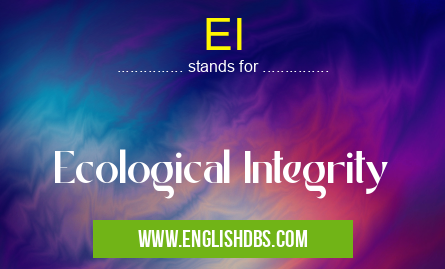What does EI mean in UNCLASSIFIED
EI stands for Ecological Integrity, a term used to describe the condition of an ecosystem in which its structure, composition, and function are unimpaired by human activities. It encompasses the health and resilience of ecosystems, including their ability to sustain biodiversity, provide ecosystem services, and adapt to environmental changes.

EI meaning in Unclassified in Miscellaneous
EI mostly used in an acronym Unclassified in Category Miscellaneous that means Ecological Integrity
Shorthand: EI,
Full Form: Ecological Integrity
For more information of "Ecological Integrity", see the section below.
Meaning of EI
EI represents a state of ecological balance and stability where ecosystems function effectively and maintain their natural processes. It involves assessing the integrity of ecosystems based on their ability to:
- Maintain biodiversity and species richness
- Support healthy and diverse biological communities
- Function effectively without degradation or impairment
- Adapt to natural disturbances and environmental changes
Essential Questions and Answers on Ecological Integrity in "MISCELLANEOUS»UNFILED"
What is Ecological Integrity (EI)?
Ecological Integrity (EI) refers to the unimpaired condition of natural ecosystems, where their composition, structure, function, and processes are maintained within a naturally occurring range of variability. It encompasses the health, resilience, and ability of ecosystems to sustain themselves and provide essential goods and services for both human and non-human life.
Why is Ecological Integrity important?
Ecological Integrity is crucial because it underpins the health and stability of ecosystems, which in turn provide vital benefits to society. Intact ecosystems regulate climate, purify water and air, support biodiversity, and offer recreational opportunities. Protecting EI is essential for maintaining human well-being, economic prosperity, and the long-term sustainability of the planet.
What are the threats to Ecological Integrity?
Ecological Integrity is threatened by various human activities, including habitat loss, fragmentation, pollution, climate change, invasive species, and overexploitation of natural resources. These pressures disrupt ecosystem processes, reduce biodiversity, and undermine the overall health and functioning of natural systems.
How can we protect and restore Ecological Integrity?
Protecting and restoring Ecological Integrity requires a multifaceted approach that includes:
- Establishing protected areas and managing them effectively to minimize human impacts
- Reducing pollution and mitigating the effects of climate change
- Implementing sustainable land use practices that minimize habitat loss and fragmentation
- Controlling invasive species and restoring native ecosystems
- Promoting responsible consumption and reducing our ecological footprint
What are some indicators of Ecological Integrity?
Indicators of Ecological Integrity include:
- Species biodiversity and abundance
- Ecosystem structure and complexity
- Natural disturbance regimes
- Water quality and availability
- Soil health and productivity
Final Words: EI is a crucial concept in environmental management and conservation. By striving to maintain ecological integrity, we can preserve the health and resilience of our ecosystems, ensuring their long-term sustainability and the well-being of both human and natural communities.
EI also stands for: |
|
| All stands for EI |
